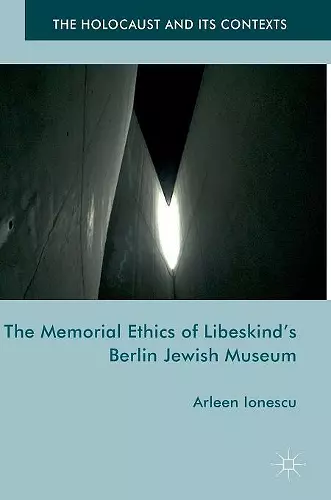The Memorial Ethics of Libeskind's Berlin Jewish Museum
Format:Hardback
Publisher:Palgrave Macmillan
Published:28th Feb '17
Should be back in stock very soon

"This seminally vibrant book explores the labyrinth of memory, forgetfulness and frequently repressed emotions linked to the uniquely traumatic catastrophe of the Holocaust. It focuses on Daniel Libeskind's architectural effort to capture what remains an eternal defiance to human understanding. To put it briefly, it is about monuments, annihilation, and the attempt to make us hear the desperate whispers of the millions who were murdered. Arleen Ionescu's book is urgently important, intellectually and morally." (Vladimir Tismaneanu, University of Maryland, USA, author of "The Devil in History: Communism, Fascism, and Some Lessons of the Twentieth Century") "An illuminating and ethically responsive timely guide to the strands of notions, ideas, trends and controversies whose nexus is a master-work of conceptual art, the book culminates in a passage through the museum itself, reading its exhibits and listening to Libeskind's architectural voids as to echo chambers." (Leona Toker, The Hebrew University of Jerusalem, Israel, author of "Return from the Archipelago: Narratives of Gulag Survivors and of Towards the Ethics of Form in Fiction")
This book is a detailed critical study of Libeskind’s Berlin Jewish Museum in its historical, architectural and philosophical context. Ionescu also extends the Museum’s experiential dimension by proposing her own subjective walk through Libeskind’s space reimagined as a ‘literary museum’.
This book is a detailed critical study of Libeskind’s Berlin Jewish Museum in its historical, architectural and philosophical context. Emphasizing how the Holocaust changed our perception of history, memory, witnessing and representation, it develops the notion of ‘memorial ethics’ to explore the Museum’s difference from more conventional post-World War Two commemorative sites. The main focus is on the Museum as an experience of the materiality of trauma which engages the visitor in a performative duty to remember. Arleen Ionescu builds on Levinas’s idea of ‘ethics as optics’ to show how Libeskind’s Museum becomes a testimony to the unpresentable Other. Ionescu also extends the Museum’s experiential dimension by proposing her own subjective walk through Libeskind’s space reimagined as a ‘literary museum’. Featuring reflections on texts by Beckett, Celan, Derrida, Kafka, Blanchot, Wiesel and Selma Meerbaum-Eisinger (Celan’s cousin), this virtual tour concludes with a brief account ofLibeskind’s analogous ‘healing project’ for Ground Zero.
ISBN: 9781137538307
Dimensions: unknown
Weight: unknown
305 pages
1st ed. 2017